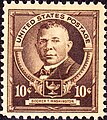Wikipedia:Selected anniversaries/April 7
This is a list of selected April 7 anniversaries that appear in the "On this day" section of the Main Page. To suggest a new item, in most cases, you can be bold and edit this page. Please read the selected anniversaries guidelines before making your edit. However, if your addition might be controversial or on a day that is or will soon be on the Main Page, please post your suggestion on the talk page instead.
Please note that the events listed on the Main Page are chosen based more on relative article quality and to maintain a mix of topics, not based solely on how important or significant their subjects are. Only four to five events are posted at a time and thus not everything that is "most important and significant" can be listed. In addition, an event is generally not posted this year if it is also the subject of the scheduled featured article, featured list or picture of the day.
To report an error when this appears on the Main Page, see Main Page errors. Please remember that this list defers to the supporting articles, so it is best to achieve consensus and make any necessary changes there first.
Images
Use only ONE image at a time
-
Flag of the Ba'ath Party
-
The Yamato explodes (too small at 100px)
-
Byzantine Emperor Justinian I (requires undeletion)
-
Booker T. Washington on a stamp
Ineligible
| Blurb | Why ineligible |
|---|---|
| 529 – Byzantine Emperor Justinian I issued the first draft of the Corpus Juris Civilis, a collection of fundamental works in jurisprudence. | refimprove |
| 1868 – Thomas D'Arcy McGee, a Canadian Father of Confederation, was assassinated; to date, the only Canadian political assassination at the federal level. | refimprove |
| 1954 – Cold War: U.S. President Dwight D. Eisenhower introduced the domino theory, speculating that if one nation in a region came under the influence of communism, then its surrounding countries would follow in a domino effect. | original research, unreferenced sections |
| 1956 – Spain relinquished its protectorate in Morocco. | refimprove |
| 2010 - Thousands rioted in the Kyrgyz capital of Bishkek resulting in the collapse of the Kurmanbek Bakiyev government. | multiple issues |
Eligible
- 1348 – Charles, King of Bohemia, issued a Golden Bull to establish Charles University in Prague, the first university in Central Europe.
- 1788 – American pioneers established the town of Marietta (in modern Ohio), the first permanent American settlement outside the original Thirteen Colonies.
- 1805 – German composer Ludwig van Beethoven premiered his Third Symphony, at the Theater an der Wien in Vienna.
- 1862 – American Civil War: Union forces defeated Confederates at the Battle of Shiloh, the bloodiest battle in U.S. history at the time, in Hardin County, Tennessee.
- 1896 – An Arctic expedition led by Norwegian explorer Fridtjof Nansen reached 86°13.6'N, almost three degrees beyond the previous Farthest North mark.
- 1940 – Educator Booker T. Washington became the first African American to be featured on a U.S. postage stamp (pictured).
- 1945 – World War II: American forces sank Japan's Yamato, the largest battleship in the world, during Operation Ten-Go.
- 1948 – The United Nations established the World Health Organization to act as a coordinating authority on
international public health.
- 1995 – First Chechen War: Russian paramilitary troops began a massacre of at least 250 civilians in Samashki, Chechnya.
April 7: Holy Saturday (Western Christianity, 2012); World Health Day
- 1724 – Johann Sebastian Bach debuted the St John Passion, a musical representation of the Passion, at the St. Thomas Church in Leipzig.
- 1767 – Troops of the Burmese Konbaung Dynasty sacked the Siamese city of Ayutthaya to end the Burmese–Siamese War (1765–1767), bringing the four-century-old Ayutthaya Kingdom to an end.
- 1947 – The Arab Ba'ath Party was founded in Damascus.
- 1994 – A FedEx employee tried to hijack Federal Express Flight 705 in a failed suicide attempt.
- 2001 – NASA's 2001 Mars Odyssey (artist's conception pictured), currently the longest-surviving continually active spacecraft in orbit around a planet other than Earth, launched from Cape Canaveral.





